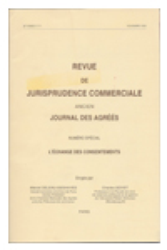Compliance and Regulation Law bilingual Dictionnary

In principle, the very mechanism of the market is governed by freedom, the freedoms of the agents themselves - the freedom to undertake and contract - and the competitive freedom that marks the market itself, the convergence of these freedoms allowing the self-regulated functioning of The "market law", namely the massive encounter of offers and demands that generates the right price ("fair price").
But in the case of financial markets, which are regulated markets, "market abuses" are sanctioned at the very heart of regulation. Indeed, the regulation of the financial markets presupposes that the information is distributed there for the benefit of investors, or even other stakeholders, possibly information not exclusively financial. This integrity of the financial markets which, beyond the integrity of information, must achieve transparency, justifies that information is fully and equally shared. That is why those who hold or must hold information that is not shared by others (privileged information) must not use it in the market until they have made it public. Similarly, they should not send bad information to the market. Neither should they manipulate stock market prices.
These sanctions were essentially conceived by the American financial theory, concretized by the American courts, then taken back in Europe. To the extent that they sanction both reproachable behavior and constitute a public policy instrument of direction and protection of markets, the question of cumulation of criminal law and administrative repressive law can only be posed with difficulty in Europe.
Sept. 11, 2014
Blog
 La Cour européennes des droits de l'Homme a condamné la France par deux arrêts du 26 juin 2014, Mennesson c/ France et Labassées c/ France. Certains en ont immédiatement déduit que la France devait transcrire sur l'état civil une filiation entre l'enfant issu d'un contrat de maternité pour autrui (que beaucoup appellent G.P.A.) et les personnes qui l'ont commandité (qui se désignent eux-mêmes comme "parents d'intention" et que d'autres appellent "acheteurs de bébé").
La Cour européennes des droits de l'Homme a condamné la France par deux arrêts du 26 juin 2014, Mennesson c/ France et Labassées c/ France. Certains en ont immédiatement déduit que la France devait transcrire sur l'état civil une filiation entre l'enfant issu d'un contrat de maternité pour autrui (que beaucoup appellent G.P.A.) et les personnes qui l'ont commandité (qui se désignent eux-mêmes comme "parents d'intention" et que d'autres appellent "acheteurs de bébé").
Pour l'instant, l'Etat français n'a pas fait appel.
Mais a-t-on prêté attention à l'arrêt rendu moins de 15 jours plus tard, à propos de l'Etat belge ?
Dans l'arrêt du 8 juillet 2014, D. et autres c/ Belgique, la Cour semble prendre le contrepied de ce qu'elle a elle-même dit. Il faut dire que cela n'est pas la même section qui a rendu la décision. Mais ici, la décision est définitive.
L'arrêt, qui ici rejette la requête formée contre l'Etat belge par le couple ayant commandé le bébé à une jeune ukrainienne, est au contraire extrêmement sévère pour les commanditaires et pour l'enfant !
Comment comprendre cela ?
Alors que les arrêts du 26 juin 2014, Mennesson c/ France et Labassée c/ France, rendus une autre section de la même Cour ont condamné l'Etat français en donnant satisfaction au couple qui avait commandé le bébé à une jeune californienne ...
Une Cour schizophrène ?
Nov. 15, 1995
Publications

Référence complète : FRISON-ROCHE, Marie-Anne (dir.), L'échange des consentements, in Revue de Jurisprudence commerciale, n° spéciale, n°11, 1995, 170 pages.